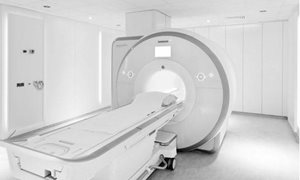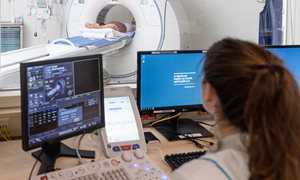What is an MRI examination?
With an MRI scan potential abnormalities of the prostate gland can be made visible. The information provides only a general description of a procedure. It may be that your specialist requests a procedure that may vary from the one described here.MRI Checklist
Please read and complete the following checklist before your appointment. download the pdf fileThe examination
Before the examination
Because we are examining your prostate, some additional preparations should be made. lees meerBefore the examination
Sexual activity/ejaculation
Sexual activity, in particular ejaculation, influences the quality of the images of the prostate gland and can make interpretation of the MRI images more difficult. For this reason we ask you to refrain from sexual activity or ejaculation for 4 days prior to your appointment.
No metal
Metal objects in or outside your body are attracted to the strong magnet in the scanner, therefore, you may not enter the MRI examination room with, for example, a wheelchair, keys or coins. Credit/bank cards with a magnetic chip, hearing aids, mobile phones and watches, are damaged when close to the strong magnet in the scanner (the magnet is always switched on!).
Should you (or your companion) have a pacemaker/defibrillator (ICD), a neurostimulator in the spine, aneurysm clips, dentures/teeth with implanted magnetic fastenings, a bladder stimulator or a permanent insulin pump, then you may not enter the examination room. This also applies to foreign metal objects, such as metal splinters (especially in or near the eyes), shrapnel or bullet wounds and older types of heart valves, aneurysm clips or certain cochlear (ear) implants. You may be required to problem.
Clothing and jewelry
Unless otherwise requested by your specialist, you may continue to take any medications and eat and drink normally. Rings and piercings made of gold or silver may be worn as the magnet doesn’t affect these items. All other items of jewellery and watches are best left at home. Please wear comfortable clothing with separate top and bottoms. Should any clothing contain metal parts (e.g. zips or underwired bras) you will be given a gown to wear.
Medications
Usually you can continue to take your medications as prescribed, however your doctor may advise you to temporarily stop taking certain medications. We would advise you to bring your medication passport (available from your pharmacist) or alternatively, make a list of all medications that you are taking at the time of your scan.
Restroom
For an accurate diagnosis it’s very important that your bladder is empty. It’s also very important that there’s no air in your bowel. Therefore we would explicitly ask you to empty your bladder and bowel prior to the MR examination. During the MR examination the technician will insert a small tube into the rectum to remove the remaining air from your bowel. Optionally it’s also possible to insert the tube yourself.
Claustrophobia
People with severe claustrophobia may be anxious about undergoing an MRI scan. Should you have severe claustrophobia, then please inform your specialist or GP of this, as they may prescribe a mild sedative. Even a mild sedative will affect your ability to drive, so please make sure that you make other arrangements for transportation to the hospital.

During the examination
When you check in at the Radiology Department, your details will be verified and corrected if necessary. Should you have forgotten to bring your ´check list´ then you will be required to fill out a new questionnaire. read moreResults PI-RADS
Your prostate MR images are evaluated by a specialized radiologist using the PI-RADS score. read moreResults PI-RADS
Your prostate MR images are evaluated by a specialized radiologist using the PI-RADS score. With this assessment, the radiologist determines the likelihood of the presence of prostate cancer. The PI-RADS score is classified in a categories form 1 to 5.
Overview of PI-RADS scores (the likelihood of prostate cancer):
- very low (very unlikely)
- low (unlikely)
- intermediate (unclear)
- high (probably present)
- very high (very likely present)
Your practitioner will discuss the results of the MRI with you during your next appointment.
More information
Getting there
Visiting address
Radboudumc main entrance
Geert Grooteplein Zuid 10
6525 GA Nijmegen
Directions



Changing your appointment
Would you like to change or cancel your appointment? You can indicate this in your online personal medical file ’mijnRadboud’ (only in Dutch) or contact the department where you have an appointment. We will schedule a new appointment with you as soon as possible. login mijnRadboud
Department Imaging
The Imaging department examines and treats various conditions, and has three focus areas: anatomy, nuclear medicine and radiology.
go to page